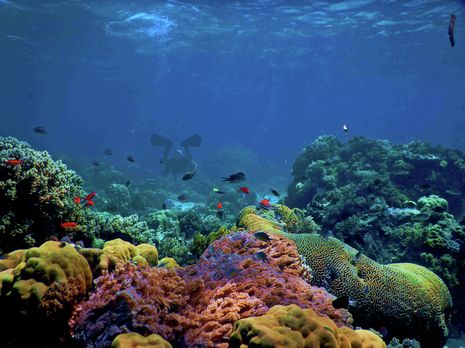Research Round-up: Week 7
The Science Editors give you the rundown of the latest scientific developments

Would you prefer a four day working week?
While NatScis and Mathmos continue to suffer six-day weeks, researchers from the University alongside academics from Boston College in the US and the think tank Autonomy have conducted the largest ever trial for a four-day working week.
Dr David Frayne, a Research Associate at the University of Cambridge, said: “We feel really encouraged by the results, which showed the many ways companies were turning the four-day week from a dream into realistic policy, with multiple benefits.”
Antisocial Fish disrupt the natural cleaning of coral reefs
Damselfish have been discovered to disrupt ‘cleaning services’ vital to the health of reefs. And climate change may mean this is only likely to get worse. New research from the University of Cambridge and Cardiff University shows that aggressive damselfish scare off the meal of choice for the Caribbean cleaner fish, the sharknose goby. Gobies consume a platter of parasites, dead tissue, scales and mucus picked off the bodies of other fishes. By removing these morsels, gobies are offering their ‘cleaning services’ to other marine life – an example of a mutually beneficial relationship between species.
But new research shows that when gobies inadvertently set up shop within the territories of aggressive damselfish, damselfish scare off the gobies’ ‘choosy client customers’, which could exacerbate coral reef breakdown
Global strategy launched to protect against new COVID-19 variants and future pandemic threats
A global strategy has launched to coordinate the complex research activities necessary for a new approach to coronavirus vaccine development to develop more effective, longer-lasting vaccines against continually emerging SARS-CoV-2 variants, and against new coronaviruses that may emerge in the future.
“The response of the scientific and medical communities to the development and delivery of COVID-19 vaccines has been incredible, but as new variants emerge and immunity begins to wane we need newer technologies. It’s vital that we continue to develop vaccine candidates to help keep us safe from the next virus threats,” said Professor Jonathan Heeney, Head of the Lab of Viral Zoonotics at the University of Cambridge and advisor on the international CVR Taskforce.
Cambridge scientists develop an early warning system to tackle the problem of food security
Working with the UK Met Office and the Ethiopian Institute of Agricultural Research, among other institutions, the team at Cambridge used weather data to help inform food-preserving decisions up to a week earlier than otherwise.
These decisions include when and where to apply fungicides for instance. Fungicides are a limited resource, but effective use can stop the spread of crop disease, such as wheat rust; the researchers estimate that their efforts have helped more than 500,000 farmers within Ethiopia deploy better-timed interventions, and contribute to the prevention of an epidemic of wheat rust.
The early warning system has now been extended to other regions, including Bangladesh, Kenya and Nepal. Director of Research in the Department of Plant Sciences, Professor Chris Gilligan, commented: “Pests and diseases remain one of the biggest threats to food production, increasingly destabilising food security and livelihoods across climate-vulnerable regions around the world. [...] Until now, these newly emerging threats have not been possible to predict.”
 News / Eight Cambridge researchers awarded €17m in ERC research grants27 December 2025
News / Eight Cambridge researchers awarded €17m in ERC research grants27 December 2025 News / Clare Hall spent over £500k opposing busway 24 December 2025
News / Clare Hall spent over £500k opposing busway 24 December 2025 Comment / League tables do more harm than good26 December 2025
Comment / League tables do more harm than good26 December 2025 Comment / The ‘class’ of Cambridge24 December 2025
Comment / The ‘class’ of Cambridge24 December 2025 News / Caius mourns its tree-mendous loss23 December 2025
News / Caius mourns its tree-mendous loss23 December 2025










